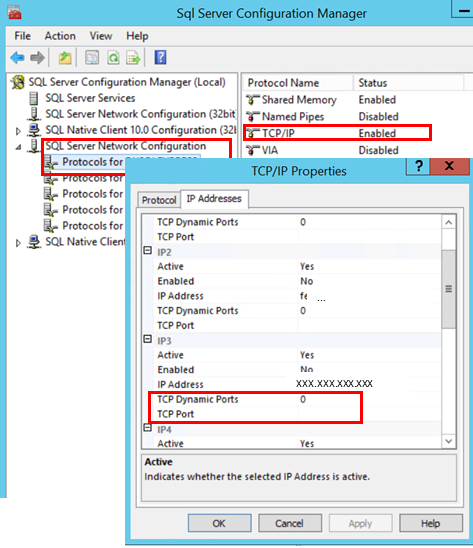When you need to find out your DB users and their permissions on DB objects use the following query to list all MS SQL users and their permissions on databases and views and get a report:
|
1 2 3 4 5 6 7 8 9 10 11 12 13 14 15 16 17 18 19 20 21 22 23 24 25 26 27 28 29 30 31 32 33 34 35 36 37 38 39 40 41 42 43 44 45 46 47 48 49 50 51 52 53 54 55 56 57 58 59 60 61 62 63 64 65 66 67 68 69 70 71 72 73 74 75 76 77 78 79 80 81 82 83 84 85 86 87 88 89 90 91 92 93 94 95 96 97 98 99 100 101 102 103 104 105 106 107 108 109 110 111 112 113 114 115 116 117 118 119 120 121 122 123 124 125 126 127 128 129 130 131 132 133 134 135 136 137 138 139 140 141 142 143 144 |
/* Security Audit Report 1) List all access provisioned to a sql user or windows user/group directly 2) List all access provisioned to a sql user or windows user/group through a database or application role 3) List all access provisioned to the public role Columns Returned: UserName : SQL or Windows/Active Directory user account. This could also be an Active Directory group. UserType : Value will be either 'SQL User' or 'Windows User'. This reflects the type of user defined for the SQL Server user account. DatabaseUserName: Name of the associated user as defined in the database user account. The database user may not be the same as the server user. Role : The role name. This will be null if the associated permissions to the object are defined at directly on the user account, otherwise this will be the name of the role that the user is a member of. PermissionType : Type of permissions the user/role has on an object. Examples could include CONNECT, EXECUTE, SELECT DELETE, INSERT, ALTER, CONTROL, TAKE OWNERSHIP, VIEW DEFINITION, etc. This value may not be populated for all roles. Some built in roles have implicit permission definitions. PermissionState : Reflects the state of the permission type, examples could include GRANT, DENY, etc. This value may not be populated for all roles. Some built in roles have implicit permission definitions. ObjectType : Type of object the user/role is assigned permissions on. Examples could include USER_TABLE, SQL_SCALAR_FUNCTION, SQL_INLINE_TABLE_VALUED_FUNCTION, SQL_STORED_PROCEDURE, VIEW, etc. This value may not be populated for all roles. Some built in roles have implicit permission definitions. ObjectName : Name of the object that the user/role is assigned permissions on. This value may not be populated for all roles. Some built in roles have implicit permission definitions. ColumnName : Name of the column of the object that the user/role is assigned permissions on. This value is only populated if the object is a table, view or a table value function. */ --List all access provisioned to a sql user or windows user/group directly SELECT [UserName] = CASE princ.[type] WHEN 'S' THEN princ.[name] WHEN 'U' THEN ulogin.[name] COLLATE Latin1_General_CI_AI END, [UserType] = CASE princ.[type] WHEN 'S' THEN 'SQL User' WHEN 'U' THEN 'Windows User' END, [DatabaseUserName] = princ.[name], [Role] = null, [PermissionType] = perm.[permission_name], [PermissionState] = perm.[state_desc], [ObjectType] = obj.type_desc,--perm.[class_desc], [ObjectName] = OBJECT_NAME(perm.major_id), [ColumnName] = col.[name] FROM --database user sys.database_principals princ LEFT JOIN --Login accounts sys.login_token ulogin on princ.[sid] = ulogin.[sid] LEFT JOIN --Permissions sys.database_permissions perm ON perm.[grantee_principal_id] = princ.[principal_id] LEFT JOIN --Table columns sys.columns col ON col.[object_id] = perm.major_id AND col.[column_id] = perm.[minor_id] LEFT JOIN sys.objects obj ON perm.[major_id] = obj.[object_id] WHERE princ.[type] in ('S','U') UNION --List all access provisioned to a sql user or windows user/group through a database or application role SELECT [UserName] = CASE memberprinc.[type] WHEN 'S' THEN memberprinc.[name] WHEN 'U' THEN ulogin.[name] COLLATE Latin1_General_CI_AI END, [UserType] = CASE memberprinc.[type] WHEN 'S' THEN 'SQL User' WHEN 'U' THEN 'Windows User' END, [DatabaseUserName] = memberprinc.[name], [Role] = roleprinc.[name], [PermissionType] = perm.[permission_name], [PermissionState] = perm.[state_desc], [ObjectType] = obj.type_desc,--perm.[class_desc], [ObjectName] = OBJECT_NAME(perm.major_id), [ColumnName] = col.[name] FROM --Role/member associations sys.database_role_members members JOIN --Roles sys.database_principals roleprinc ON roleprinc.[principal_id] = members.[role_principal_id] JOIN --Role members (database users) sys.database_principals memberprinc ON memberprinc.[principal_id] = members.[member_principal_id] LEFT JOIN --Login accounts sys.login_token ulogin on memberprinc.[sid] = ulogin.[sid] LEFT JOIN --Permissions sys.database_permissions perm ON perm.[grantee_principal_id] = roleprinc.[principal_id] LEFT JOIN --Table columns sys.columns col on col.[object_id] = perm.major_id AND col.[column_id] = perm.[minor_id] LEFT JOIN sys.objects obj ON perm.[major_id] = obj.[object_id] UNION --List all access provisioned to the public role, which everyone gets by default SELECT [UserName] = '{All Users}', [UserType] = '{All Users}', [DatabaseUserName] = '{All Users}', [Role] = roleprinc.[name], [PermissionType] = perm.[permission_name], [PermissionState] = perm.[state_desc], [ObjectType] = obj.type_desc,--perm.[class_desc], [ObjectName] = OBJECT_NAME(perm.major_id), [ColumnName] = col.[name] FROM --Roles sys.database_principals roleprinc LEFT JOIN --Role permissions sys.database_permissions perm ON perm.[grantee_principal_id] = roleprinc.[principal_id] LEFT JOIN --Table columns sys.columns col on col.[object_id] = perm.major_id AND col.[column_id] = perm.[minor_id] JOIN --All objects sys.objects obj ON obj.[object_id] = perm.[major_id] WHERE --Only roles roleprinc.[type] = 'R' AND --Only public role roleprinc.[name] = 'public' AND --Only objects of ours, not the MS objects obj.is_ms_shipped = 0 ORDER BY princ.[Name], OBJECT_NAME(perm.major_id), col.[name], perm.[permission_name], perm.[state_desc], obj.type_desc--perm.[class_desc] |






